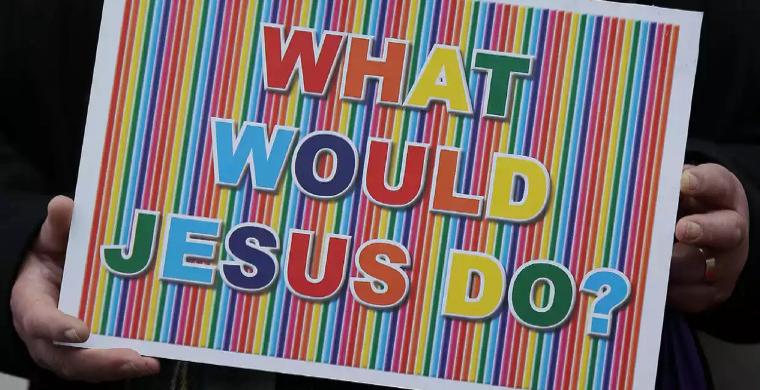Church of England demands ban on conversion therapy
Synod calls for government to ban practice aiming to change sexual orientation after hearing experiences of 'spiritual abuse' in emotional debate
The church's governing body overwhelmingly backed a motion saying conversion therapy had 'no place in the modern world'
By Harriet Sherwood Religion correspondent
https://www.theguardian.com/world/2017/jul/08/church-of-england-demands-ban-on-conversion-therapy
July 8, 2017
The Church of England has called on the government to ban conversion therapy and has condemned the practice, which aims to change sexual orientation, as unethical and potentially harmful.
At the end of an emotional debate in which two members of the C of E synod described their experiences as spiritual abuse, the church's governing body overwhelmingly backed a motion saying the practice had "no place in the modern world".
Conversion therapy is usually described as an attempt to change a person's sexual orientation or gender identity. Some churches in the C of E and other denominations have encouraged LGBT members to take part in prayer sessions and other activities to rid them of their "sin".
Proposing the motion, Jayne Ozanne -- who underwent conversion therapy resulting in two breakdowns and two spells in hospital -- said conversion therapy was "abuse from which vulnerable adults need protecting".
It was "discredited by the government, the NHS, the Royal College of Psychiatrists, the Royal College of General Practitioners and many other senior health care bodies," she said.
Quoting from a statement issued earlier this year by the UK Council for Psychotherapy and other bodies, she said: "Exclusion, stigma and prejudice may precipitate mental health issues for any person subjected to these abuses."
Ozanne quoted an online survey she recently conducted in the LGBTI community, in which just under 40% of her 553 respondents said they had undergone some form of conversion therapy.
More than two-thirds said they had chosen to do so because they believed their sexual orientation to be "sinful". Just under three-quarters were under the age of 20 when they began conversion therapy.
Ed Cox, of the C of E's youth council, struggled to maintain composure as he spoke of his personal experience of being told his sexual orientation was a lifestyle choice or phase and needed prayer.
"This fundamentally says I was made wrong," he told the synod. As a result of what he described as spiritual abuse, he suffered severe depression.
John Sentamu, the archbishop of York, said conversion therapy was "theologically unsound, so the sooner the practice of [it] is banned, I can sleep at night".
Paul Bayes, the bishop of Liverpool, said LGBT orientation was neither a crime nor a sin. "We don't need to engage people in healing therapy if they are not sick."
Fenella Cannings-Jurd, a student at Durham university, said she found it hard to believe that "in 2017 we are seriously debating the pros and cons of conversion therapy". It was "by and large" seen as a violation of basic human rights, she said.
Some synod members expressed concern that the motion would limit the church's ability to offer pastoral care and prayer for people struggling with issues of sexual desire and orientation.
The final vote, after a complicated series of amendments, was 298 to 74, with 26 abstentions. The motion had the backing of all three houses of the synod, the bishops, clergy and laity.
Speaking before the debate, Ozanne said she wanted the church to make a clear public statement. As the established church "we can encourage other denominations and faiths to consider their positions on this", she said.
Conversion therapy was particularly prevalent in minority ethnic Pentecostal denominations, and in some extreme cases young people were sent back to their family's country of origin for "corrective rape".
In a letter to members of synod, Sonia Soans, the editor of Asylum magazine for democratic psychiatry, recounted the case of Esther, a British lesbian and Anglican, who was taken to her parents' native country on the pretext of a holiday a few years ago.
"Very quickly, Esther learned she was being forced into a marriage with a man she did not know. Her conversion included some religious rituals, with prayers for her conversion being offered by those around her," wrote Soans.
When Esther protested, she was locked in her house, but managed to escape. "She lives in hiding now, as she fears her family will track her down and perhaps kill her." She suffers from panic attacks and sleeplessness.
Ozanne quoted from a letter she had received from a 90-year-old C of E priest, who said: "I am a celibate homosexual and have suffered a lifetime of reactive depression resulting from my inability to accept my sexual orientation ...
"I was brought up an evangelical Christian. The trouble started for real when in my early 20s a fundamentalist Christian sought to exorcise my 'demon' as he called [it], but failed to do so. This resulted in a breakdown and hospitalisation where I was administered electric current therapy. After that I had testosterone injections for a year administered by my local GP.
"There followed two years of Freudian analysis in the hope that my sexual orientation would be redirected. I was then given lithium ... followed by no end of personal counselling, therapy and prayer, all of which totally failed to make one jot of difference to my sexual inclinations ... On two occasions, I have contemplated suicide."
HOW THEY VOTED:
Members voted by houses on the amended motion.
The votes in the House of Bishops were 36 for and one against, with no abstentions.
In the House of Clergy 135 backed the motion with 25 against and 13 abstentions.
In the House of Laity 127 supported the motion with 48 opposing and 13 abstentions.
END














